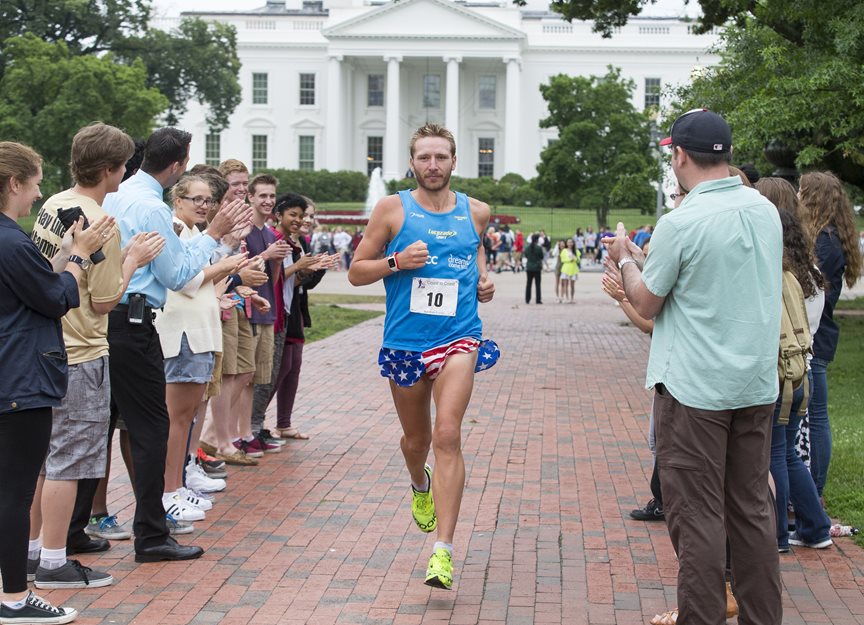Last updated: 02-Mar-16
Written by Sports Dietitian Rin Cobb
Food, whatever your relationship, is one thing we all have in common. In the world of ultra running, food can take on a whole new meaning with some ultras more infamous for their catering than for their route and race set up itself. I’ve even heard runners describe ultras as food fests, so how important is eating on the go and what should your running menu look like?
Running for hours on end needs a constant fuel supply, namely a mixed ratio of fat and carbs. As to how much of each depends very much on how hard and fast your running and for how long but generally speaking the longer and harder, the more carbs you’ll need. Whilst you’ve got a ready supply of body fat for fuel, carbs are not stored particularly well in the body so will need to be constantly replenished during these long runs and races to ensure your body has enough fuel to finish and perform your best.
There shouldn’t be any debate that ultra runners need to eat on the go and for some of you the capacity to eat whilst running never ceases to amaze me. I’ve certainly come across some quite remarkable feasts out on the trails such as onion bhajis and left over tikka masala but for some of you this maybe easier said than done. Runners are notorious for having stomach issues or the dreaded runners trots but the gut can adapt and those that routinely eat during training runs are less likely to suffer these disruptive or even race-ending symptoms, so building in nutritional training to your usual routine can make a real difference come race day.
As a dietitian I’m always harping on about food first rather than relying solely on supplements, particularly for ultras when six hours of gels can be both unappealing and difficult to stomach not to mention expensive, so what can a running menu look like? First ask yourself these few questions:
- What do I need for fuel; think about distance, terrain, environment
- What can I tolerate; what’s worked during training
- What’s practical; self sufficient, checkpoint catering
As already mentioned, you’ll run out of carbs before fat so these need to take priority and the following table has some real food suggestions. These all provide 30-40g carbs and rather than just aiming to get as many calories into you, it’s recommended to try and aim for 30-60g carbs per hour for endurance. However if consuming both glucose and fructose carb sources, you could aim for up to 90g hour which maybe more effective for ultras if able to tolerate.
For some this may look like a lot of food to eat per hour but you could spread these out, eating little and often and don’t forget carb based drinks could also be included so rather than just water try to make the most of your fluids. A standard sports drink will also provide 30-45g carbs in 500mls at a 6-9% concentration, which seems to be the optimal composition for gut absorption. You could also try making your own home-made sports drink using 300mls fruit juice topped up with 200mls water or coconut water for extra electrolytes and a pinch of salt. When doing your food shop, have a look at the nutrition label and check total carbs per 100g as some brands or flavours will be better on the carb front than others or you could even try making your own carby snacks like flapjacks, granola bars or see my energy bites recipe for inspiration.
Most will find just eating and drinking carbs quite monotonous and may in fact prevent them from eating enough especially later on in a race so try to vary your choices and it’s ok to include some more savoury low carb options like jerky, nuts or mini cheeses but just remember foods high in fat and protein will take longer to digest so can cause stomach issues.
Keeping yourself fuelled right for ultras is essential to be able to complete or compete. Using real foods can be more appealing than just sports supplements and it is possible to meet your hourly fuel needs through food first, however rather than just using on race day, eating on the go during training can help the gut adapt whilst supporting your training needs and also give you the confidence in what works for you. Why not share some of your ultra running foods to go?
Running snacks providing 30-40g carbs
- 50g dried fruit (2tblsp)
- 8 dried apricots
- Large banana
- 8 jelly babies
- 2 scotch pancakes + tsp choc spread/jam/honey
- 4 Jaffa cakes
- Pack of Belvita biscuits
- Bagel
- Tortilla wrap + tbsp. choc spread/jam/honey
- 190g rice pudding pot or Muller rice
- Malt loaf (1/5th)
- Flapjack (50g)
- Standard Mars bar
Energy Bites (makes approx. 10)
- 250g marzipan
- 125g chopped dried fruit
- 50g mixed seeds/chopped nuts
Mix ingredients together, by hand is easiest and roll into small balls.
Should make approx. 10 to give you an idea of size.
Each energy ball provides ~30g carbs.
Try adding or dusting with cocoa, cinnamon or others spices to mix it up a bit.




